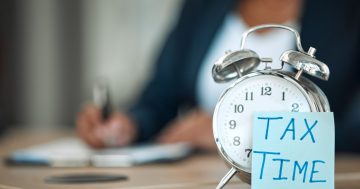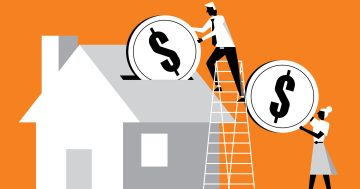Matt Johnson* says the tax deadline is fast approaching and explains how to avoid making some costly mistakes.
 Australians leaving their tax returns to the last minute have been warned to double-check their income and spending records to avoid paying a hefty tax bill.
Australians leaving their tax returns to the last minute have been warned to double-check their income and spending records to avoid paying a hefty tax bill.
With the deadline for self-lodged returns two weeks away (October 31), H&R Block tax communications director Mark Chapman said taxpayers have most commonly struggled with new pandemic-related deductions.
“Obviously more people are working from home, and if workers don’t get [their returns] right, it could be picked up by the Australian Tax Office (ATO) in an audit down the road,” Mr Chapman told The New Daily.
So ahead of the deadline, here’s how to avoid making some costly tax time mistakes.
- Choosing the wrong working from home method
Prior to the tax period, the ATO introduced an 80 cents-per-hour working from home tax deduction scheme, which has subsequently been extended to December 31. This allows workers to claim all their work-related expenses by maintaining a weekly timesheet.
However, Mr Chapman said although it streamlined the process, many taxpayers could claim more deductions if they opted for the previous 52 cents-per-hour fixed rate method.
This approach also requires a timesheet, but it allows workers to claim the work-related portion of other expenses such as phone and internet bills on top of this, whereas the 80 cents method is all inclusive.
“People don’t realise they can effectively lose money just by rushing into the 80 cents rate, without considering the alternative,” Mr Chapman said.
- Double-dipping on work expenses
Mr Chapman said there’s anecdotal evidence of workers “double-dipping” by claiming the 80 cents per hour method in addition to other work-related deductions.
He said taxpayers who did this could have to pay back the extra money claimed, see their refund converted into a tax liability, or face significant financial penalties if the ATO finds deliberate mistakes in an audit.
“They could be looking at anything from paying 25 to 75 per cent of the shortfall amount, and that could turn out to be very expensive,” Mr Chapman said.
- Copy-and-pasting last year’s return
With most workers unlikely to replicate the number of work-related trips and car journeys in a pandemic-afflicted financial year, odds are they incurred fewer expenses than usual.
However, Mr Chapman said taxpayers run the risk of overclaiming deductions if they intend to copy and paste their income and deductions from the 2018-19 financial year.
Instead, taxpayers should use “common sense” to double-check they are not making claims for expenses they never incurred, he said.
“You do really need to start from scratch,” Mr Chapman said.
“By all means look at last year and see what you claimed, but then ask yourself if you incurred that same expense this year or whether you perhaps spent even more, so you could make a bigger claim.”
- Failing to keep invoices and receipts
Year after year, the most common blunder taxpayers make is not retaining copies of receipts or – in the case of self-employed, freelance or contracted workers – invoices.
Considering the ATO’s expectations that taxpayers retain their tax-related paperwork for five years, Mr Chapman said workers not only lose out on deductions but run the risk of having no supporting evidence during an audit.
“Ultimately, if you don’t have proof, you can’t make the claim,” Mr Chapman said.
“Sometimes it’s possible to go back to retailers and get copies of receipts you’ve lost, so it’s worthwhile to track down those missing receipts if you do intend on making that deduction, or even using a bank or credit card statement as proof you incurred that expense.”
- Forgetting income from other sources
More Australians have diversified their incomes through the pandemic as they weathered job losses, reduced hours, or attempted to increase their savings in anticipation of hard times ahead.
But taxpayers often forget to include that supplementary income in their tax statements, Mr Chapman said.
“You get a lot of people who drive for Uber or rent out a home through Airbnb, or they might have a separate business they regard as a hobby, or even buying and selling cryptocurrencies – and they don’t appreciate that those things have tax consequences,” he said.
“So it’s definitely worthwhile ensuring all your income is declared.”
- Not checking auto-filled information
Lastly, Mr Chapman noted that some participants in the government’s early super access scheme saw their withdrawals pre-filled in their tax statement as assessable income by their super fund.
Unless a self-lodger picks up on the mistake (as amounts taken out under the scheme are not taxable), they could be paying tax on a substantially larger amount.
Mr Chapman said it served as a reminder for taxpayers to double-check all the pre-filled information in their application, including income statements provided by their employer.
“Ninety-nine per cent of the time it should be right,” he said.
“But you don’t want to be the 1 per cent that ends up either with something missing or something that’s reported twice and paid at the wrong rate, so you end up paying more.”
*Matt Johnson is a property and personal finance reporter. He can be contacted on Twitter @matte_johnson.
This article first appeared at thenewdaily.com.au











